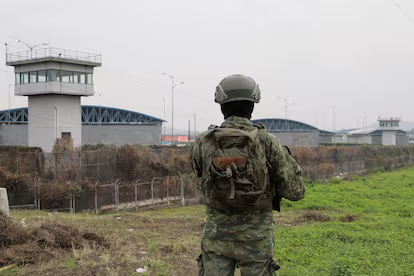Ecuador regains control of the country’s prisons
The army entered the penitentiaries heavily armed Thursday and freed more than 150 people, including guards and administrative personnel, who were being held hostage


Ecuador has regained control of the country’s prisons. The army entered the penitentiaries heavily armed Thursday and freed more than 150 people, including guards and administrative personnel, who were being held hostage. At least one official was killed during the operations, which were otherwise carried out without bloodshed. The prisoners were assembled in the courtyards of the prisons, in rows and seated, with their hands behind their heads, in images reminiscent of those shared by President Nayib Bukele in El Salvador to demonstrate his government’s success in its war on the gangs.
Ecuador’s gangs, which are dedicated to drug-trafficking in alliance with Mexican cartels, have until now dominated the prisons. From inside the penal system, they are able to control their organizations as if their cells were a command post. Some reports suggest, however, that the authorities’ hold over the prisons may not be complete. At the Esmeraldas prison, located in the region of the same name that has been co-opted by organized crime, 48 inmates escaped, with two killed during a pursuit. Early Sunday morning, another six escaped from the Litoral penitentiary in Guayaquil, where the authorities had reportedly wrested back control.
The wave of violence in Ecuador began eight days ago with the escape of two of the country’s most notorious gang leaders, José Adolfo Macías Villamar, alias Fito, the leader of Los Choneros — considered the most dangerous criminal in Ecuador — and Fabricio Colón Pico, the head of rival group Los Lobos. A chain of attacks and assaults ensued as organized crime challenged the authorities in the prisons and on the streets. A group of hooded and armed men staged a live assault on the public channel TC Television, threatening journalists with guns and dynamite. The purpose of the attack remains a mystery. The assailants, all young men and teenagers, surrendered as soon as the police arrived on the scene, without putting up any resistance.
Ecuadorian President Daniel Noboa last week declared an “internal armed conflict,” which implies there is a war within the country and entailed the immediate deployment and intervention of security forces against organized crime. A curfew has been established, from 11 p.m. to 5 a.m., and the army patrols the streets. Since the president’s declaration, according to official data, more than 1,500 people have been arrested, among them 158 accused of “terrorism.” Noboa has decreed that gangs should be seen as such, which provides for stiffer penalties and gives the authorities more leeway to confront them. There have been an additional 41 separate operations against organized crime groups, during which five alleged criminals have been killed and 27 people who had been held hostage have been freed.
The Presidency of the Republic, in a statement, said the operations will continue throughout the national territory “with a clear objective: to be implacable with those who have terrorized and taken advantage of citizens.” Noboa, who began his term less than two months ago, faces an enormous challenge: that of stopping the violent drift that has taken hold of the country over the last three years. His predecessors, Lenín Moreno and Guillermo Lasso, watched helplessly — or negligently, depending on who you ask — as security deteriorated in record time. Last year, the homicide rate stood at 40 per 100,000 inhabitants, one of the highest in the world. Under the leftist former president Rafael Correa (2007-2017), it was as low as 5.78, among the lowest in the region. The Ecuadorian exception has vanished in the blink of an eye.
In a very short time — with the rain of money they have made for turning the Gulf of Guayaquil into the main cocaine export point in the world — the gangs have managed to infiltrate the main branches of government. They have judges, prosecutors, police, politicians, and high-ranking military officers on their payroll. They control ports, neighborhoods, markets... and Noboa has a very limited budget to take them on. As such, he has proposed raising income tax from 12% to 15%, to address the shortage of police and military personnel, but the fact that he does not hold a majority in Congress forces him to negotiate with the rest of the political forces, which oppose tax increases. The president has also tabled a referendum, potentially in the last week of February or the first week of March, to approve the extension of penalties for serious crimes such as homicide and arms trafficking, and to increase the internal security functions of the army.
Sign up for our weekly newsletter to get more English-language news coverage from EL PAÍS USA Edition
Tu suscripción se está usando en otro dispositivo
¿Quieres añadir otro usuario a tu suscripción?
Si continúas leyendo en este dispositivo, no se podrá leer en el otro.
FlechaTu suscripción se está usando en otro dispositivo y solo puedes acceder a EL PAÍS desde un dispositivo a la vez.
Si quieres compartir tu cuenta, cambia tu suscripción a la modalidad Premium, así podrás añadir otro usuario. Cada uno accederá con su propia cuenta de email, lo que os permitirá personalizar vuestra experiencia en EL PAÍS.
¿Tienes una suscripción de empresa? Accede aquí para contratar más cuentas.
En el caso de no saber quién está usando tu cuenta, te recomendamos cambiar tu contraseña aquí.
Si decides continuar compartiendo tu cuenta, este mensaje se mostrará en tu dispositivo y en el de la otra persona que está usando tu cuenta de forma indefinida, afectando a tu experiencia de lectura. Puedes consultar aquí los términos y condiciones de la suscripción digital.








































